Case Study: Leadership and Organizational Behavior at Rosset NHS Trust
VerifiedAdded on 2023/01/13
|8
|1866
|44
Case Study
AI Summary
This case study report examines leadership and organizational behavior issues at Rosset NHS Trust, a semi-autonomous unit within the NHS. The study identifies leadership problems, such as difficulties in motivating staff and implementing change, and organizational issues including pay disparities and team dynamics. It analyzes the impact of directive and autocratic leadership styles, exploring how these approaches affect employee motivation and the implementation of multiskilling plans. The report also offers recommendations for improvement, including the adoption of path-goal theory to enhance motivation and the implementation of employee engagement strategies. The conclusion emphasizes the importance of considering employee safety and well-being when implementing organizational changes, particularly in the context of multiskilling initiatives.
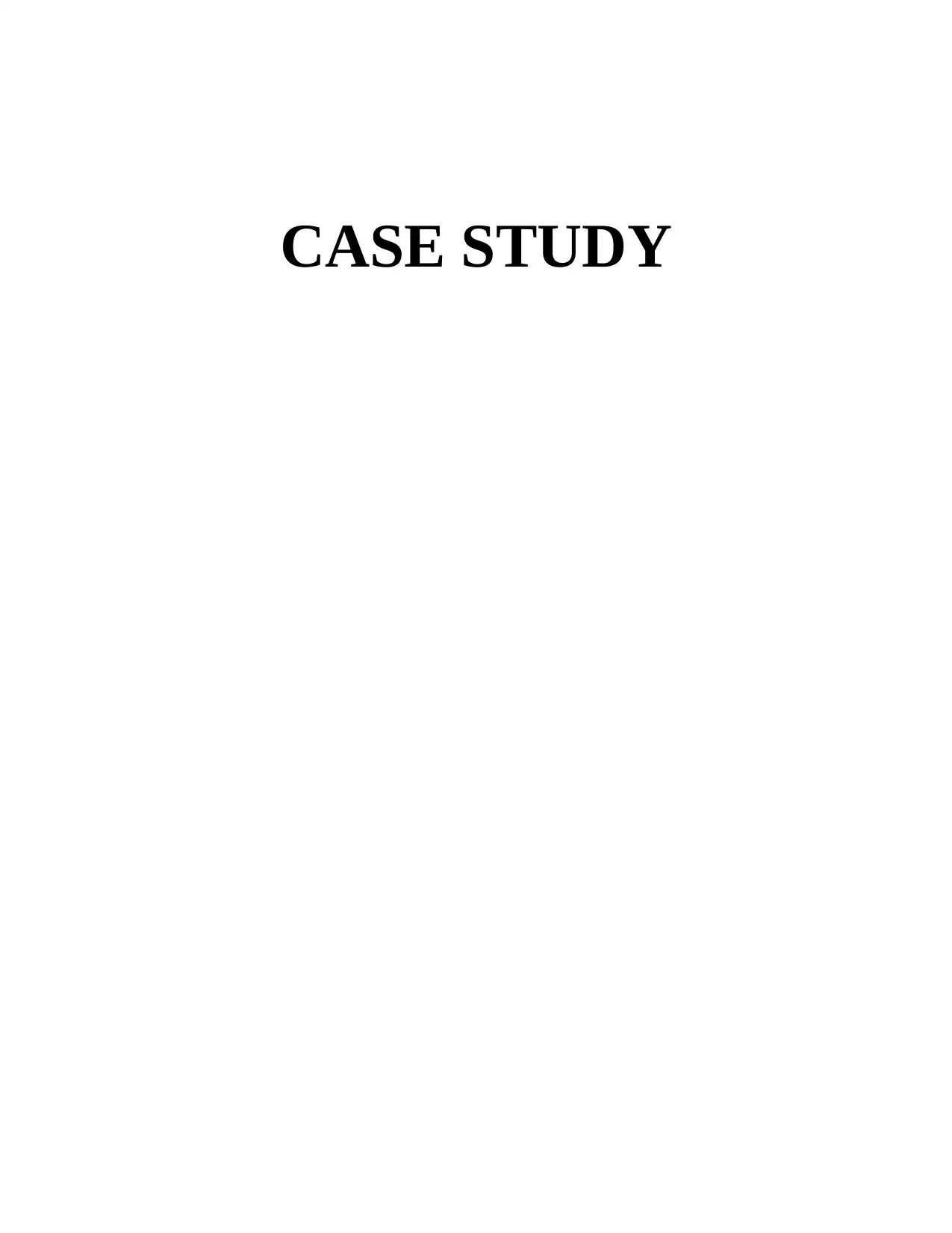
CASE STUDY
Paraphrase This Document
Need a fresh take? Get an instant paraphrase of this document with our AI Paraphraser
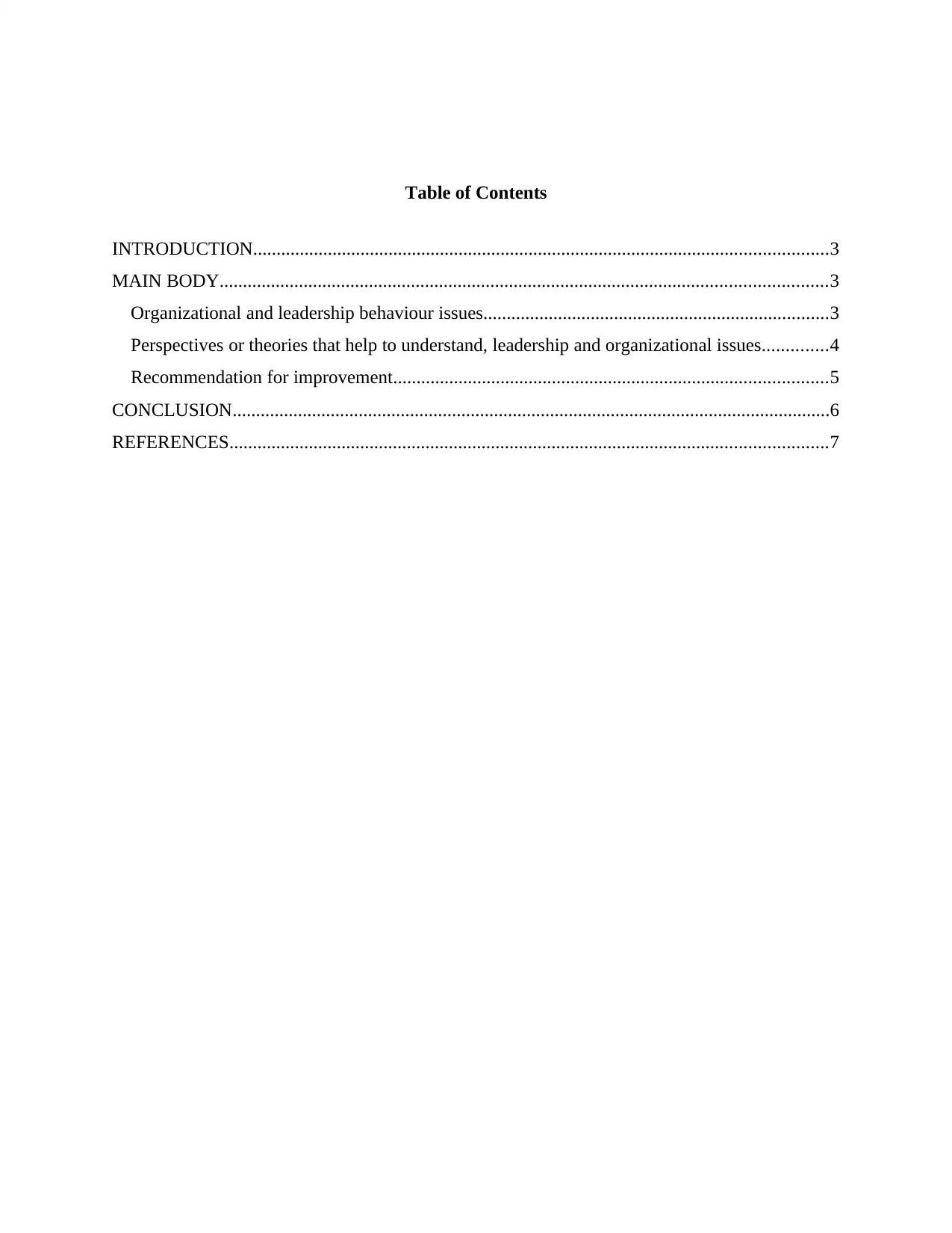
Table of Contents
INTRODUCTION...........................................................................................................................3
MAIN BODY..................................................................................................................................3
Organizational and leadership behaviour issues..........................................................................3
Perspectives or theories that help to understand, leadership and organizational issues..............4
Recommendation for improvement.............................................................................................5
CONCLUSION................................................................................................................................6
REFERENCES................................................................................................................................7
INTRODUCTION...........................................................................................................................3
MAIN BODY..................................................................................................................................3
Organizational and leadership behaviour issues..........................................................................3
Perspectives or theories that help to understand, leadership and organizational issues..............4
Recommendation for improvement.............................................................................................5
CONCLUSION................................................................................................................................6
REFERENCES................................................................................................................................7
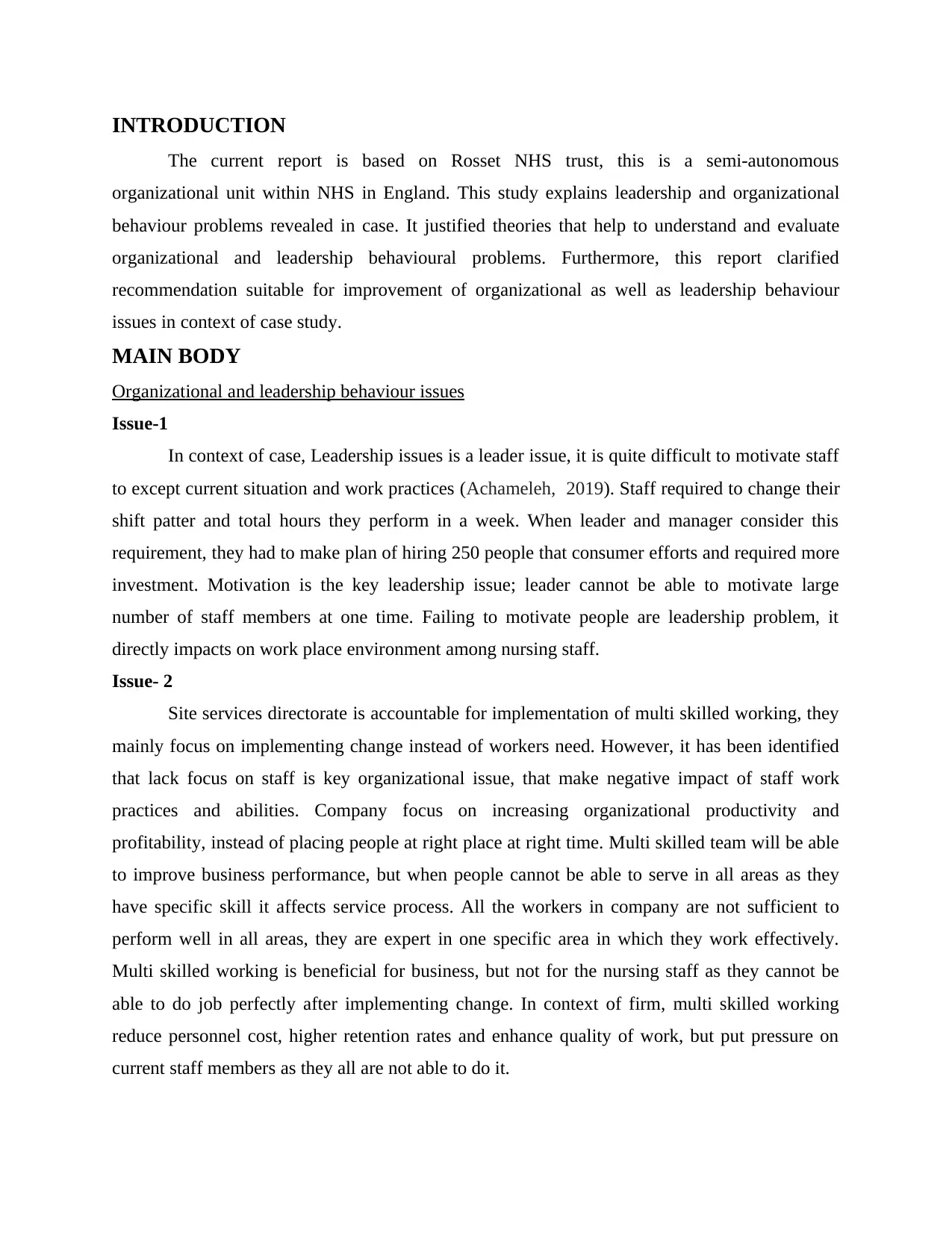
INTRODUCTION
The current report is based on Rosset NHS trust, this is a semi-autonomous
organizational unit within NHS in England. This study explains leadership and organizational
behaviour problems revealed in case. It justified theories that help to understand and evaluate
organizational and leadership behavioural problems. Furthermore, this report clarified
recommendation suitable for improvement of organizational as well as leadership behaviour
issues in context of case study.
MAIN BODY
Organizational and leadership behaviour issues
Issue-1
In context of case, Leadership issues is a leader issue, it is quite difficult to motivate staff
to except current situation and work practices (Achameleh, 2019). Staff required to change their
shift patter and total hours they perform in a week. When leader and manager consider this
requirement, they had to make plan of hiring 250 people that consumer efforts and required more
investment. Motivation is the key leadership issue; leader cannot be able to motivate large
number of staff members at one time. Failing to motivate people are leadership problem, it
directly impacts on work place environment among nursing staff.
Issue- 2
Site services directorate is accountable for implementation of multi skilled working, they
mainly focus on implementing change instead of workers need. However, it has been identified
that lack focus on staff is key organizational issue, that make negative impact of staff work
practices and abilities. Company focus on increasing organizational productivity and
profitability, instead of placing people at right place at right time. Multi skilled team will be able
to improve business performance, but when people cannot be able to serve in all areas as they
have specific skill it affects service process. All the workers in company are not sufficient to
perform well in all areas, they are expert in one specific area in which they work effectively.
Multi skilled working is beneficial for business, but not for the nursing staff as they cannot be
able to do job perfectly after implementing change. In context of firm, multi skilled working
reduce personnel cost, higher retention rates and enhance quality of work, but put pressure on
current staff members as they all are not able to do it.
The current report is based on Rosset NHS trust, this is a semi-autonomous
organizational unit within NHS in England. This study explains leadership and organizational
behaviour problems revealed in case. It justified theories that help to understand and evaluate
organizational and leadership behavioural problems. Furthermore, this report clarified
recommendation suitable for improvement of organizational as well as leadership behaviour
issues in context of case study.
MAIN BODY
Organizational and leadership behaviour issues
Issue-1
In context of case, Leadership issues is a leader issue, it is quite difficult to motivate staff
to except current situation and work practices (Achameleh, 2019). Staff required to change their
shift patter and total hours they perform in a week. When leader and manager consider this
requirement, they had to make plan of hiring 250 people that consumer efforts and required more
investment. Motivation is the key leadership issue; leader cannot be able to motivate large
number of staff members at one time. Failing to motivate people are leadership problem, it
directly impacts on work place environment among nursing staff.
Issue- 2
Site services directorate is accountable for implementation of multi skilled working, they
mainly focus on implementing change instead of workers need. However, it has been identified
that lack focus on staff is key organizational issue, that make negative impact of staff work
practices and abilities. Company focus on increasing organizational productivity and
profitability, instead of placing people at right place at right time. Multi skilled team will be able
to improve business performance, but when people cannot be able to serve in all areas as they
have specific skill it affects service process. All the workers in company are not sufficient to
perform well in all areas, they are expert in one specific area in which they work effectively.
Multi skilled working is beneficial for business, but not for the nursing staff as they cannot be
able to do job perfectly after implementing change. In context of firm, multi skilled working
reduce personnel cost, higher retention rates and enhance quality of work, but put pressure on
current staff members as they all are not able to do it.
⊘ This is a preview!⊘
Do you want full access?
Subscribe today to unlock all pages.

Trusted by 1+ million students worldwide
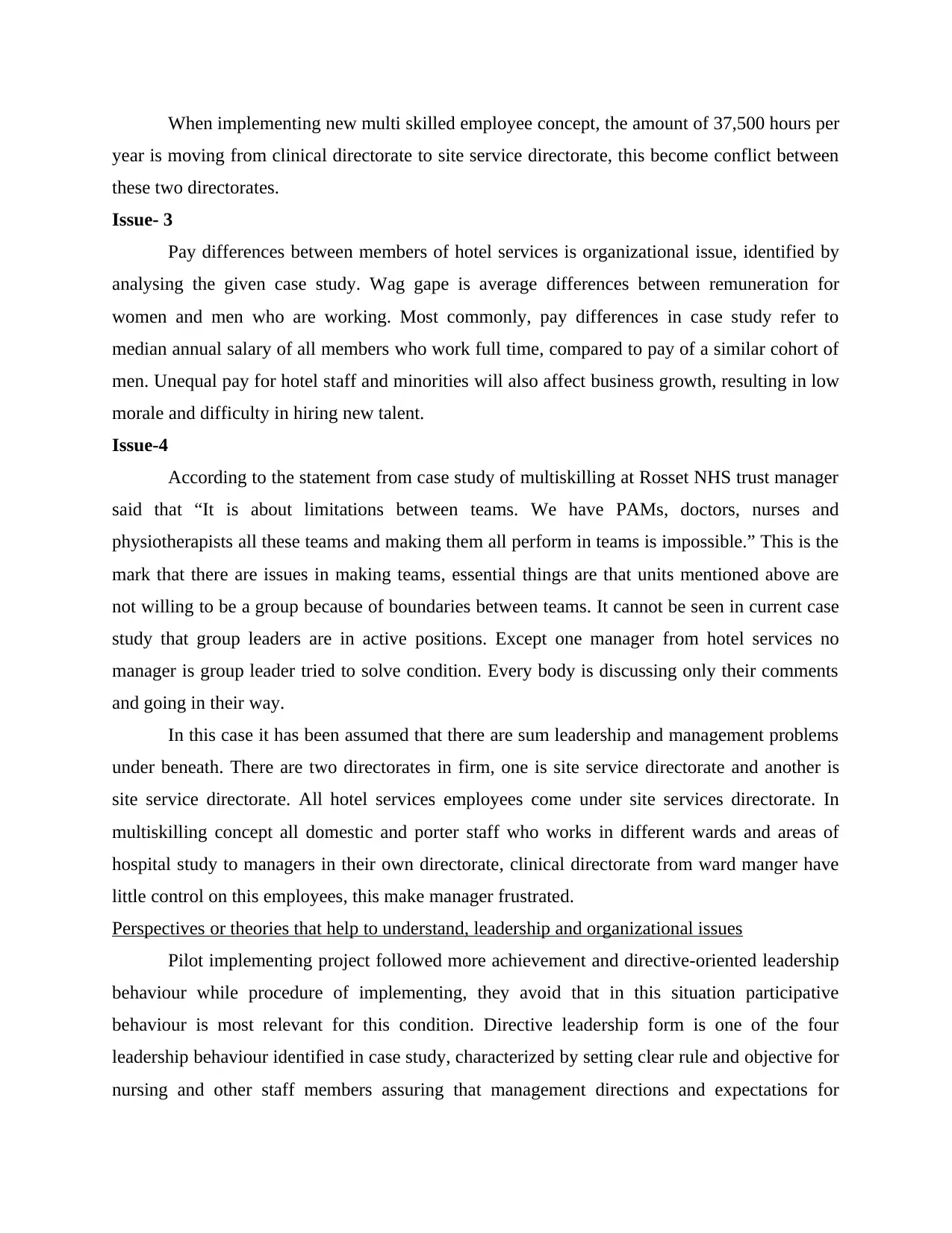
When implementing new multi skilled employee concept, the amount of 37,500 hours per
year is moving from clinical directorate to site service directorate, this become conflict between
these two directorates.
Issue- 3
Pay differences between members of hotel services is organizational issue, identified by
analysing the given case study. Wag gape is average differences between remuneration for
women and men who are working. Most commonly, pay differences in case study refer to
median annual salary of all members who work full time, compared to pay of a similar cohort of
men. Unequal pay for hotel staff and minorities will also affect business growth, resulting in low
morale and difficulty in hiring new talent.
Issue-4
According to the statement from case study of multiskilling at Rosset NHS trust manager
said that “It is about limitations between teams. We have PAMs, doctors, nurses and
physiotherapists all these teams and making them all perform in teams is impossible.” This is the
mark that there are issues in making teams, essential things are that units mentioned above are
not willing to be a group because of boundaries between teams. It cannot be seen in current case
study that group leaders are in active positions. Except one manager from hotel services no
manager is group leader tried to solve condition. Every body is discussing only their comments
and going in their way.
In this case it has been assumed that there are sum leadership and management problems
under beneath. There are two directorates in firm, one is site service directorate and another is
site service directorate. All hotel services employees come under site services directorate. In
multiskilling concept all domestic and porter staff who works in different wards and areas of
hospital study to managers in their own directorate, clinical directorate from ward manger have
little control on this employees, this make manager frustrated.
Perspectives or theories that help to understand, leadership and organizational issues
Pilot implementing project followed more achievement and directive-oriented leadership
behaviour while procedure of implementing, they avoid that in this situation participative
behaviour is most relevant for this condition. Directive leadership form is one of the four
leadership behaviour identified in case study, characterized by setting clear rule and objective for
nursing and other staff members assuring that management directions and expectations for
year is moving from clinical directorate to site service directorate, this become conflict between
these two directorates.
Issue- 3
Pay differences between members of hotel services is organizational issue, identified by
analysing the given case study. Wag gape is average differences between remuneration for
women and men who are working. Most commonly, pay differences in case study refer to
median annual salary of all members who work full time, compared to pay of a similar cohort of
men. Unequal pay for hotel staff and minorities will also affect business growth, resulting in low
morale and difficulty in hiring new talent.
Issue-4
According to the statement from case study of multiskilling at Rosset NHS trust manager
said that “It is about limitations between teams. We have PAMs, doctors, nurses and
physiotherapists all these teams and making them all perform in teams is impossible.” This is the
mark that there are issues in making teams, essential things are that units mentioned above are
not willing to be a group because of boundaries between teams. It cannot be seen in current case
study that group leaders are in active positions. Except one manager from hotel services no
manager is group leader tried to solve condition. Every body is discussing only their comments
and going in their way.
In this case it has been assumed that there are sum leadership and management problems
under beneath. There are two directorates in firm, one is site service directorate and another is
site service directorate. All hotel services employees come under site services directorate. In
multiskilling concept all domestic and porter staff who works in different wards and areas of
hospital study to managers in their own directorate, clinical directorate from ward manger have
little control on this employees, this make manager frustrated.
Perspectives or theories that help to understand, leadership and organizational issues
Pilot implementing project followed more achievement and directive-oriented leadership
behaviour while procedure of implementing, they avoid that in this situation participative
behaviour is most relevant for this condition. Directive leadership form is one of the four
leadership behaviour identified in case study, characterized by setting clear rule and objective for
nursing and other staff members assuring that management directions and expectations for
Paraphrase This Document
Need a fresh take? Get an instant paraphrase of this document with our AI Paraphraser
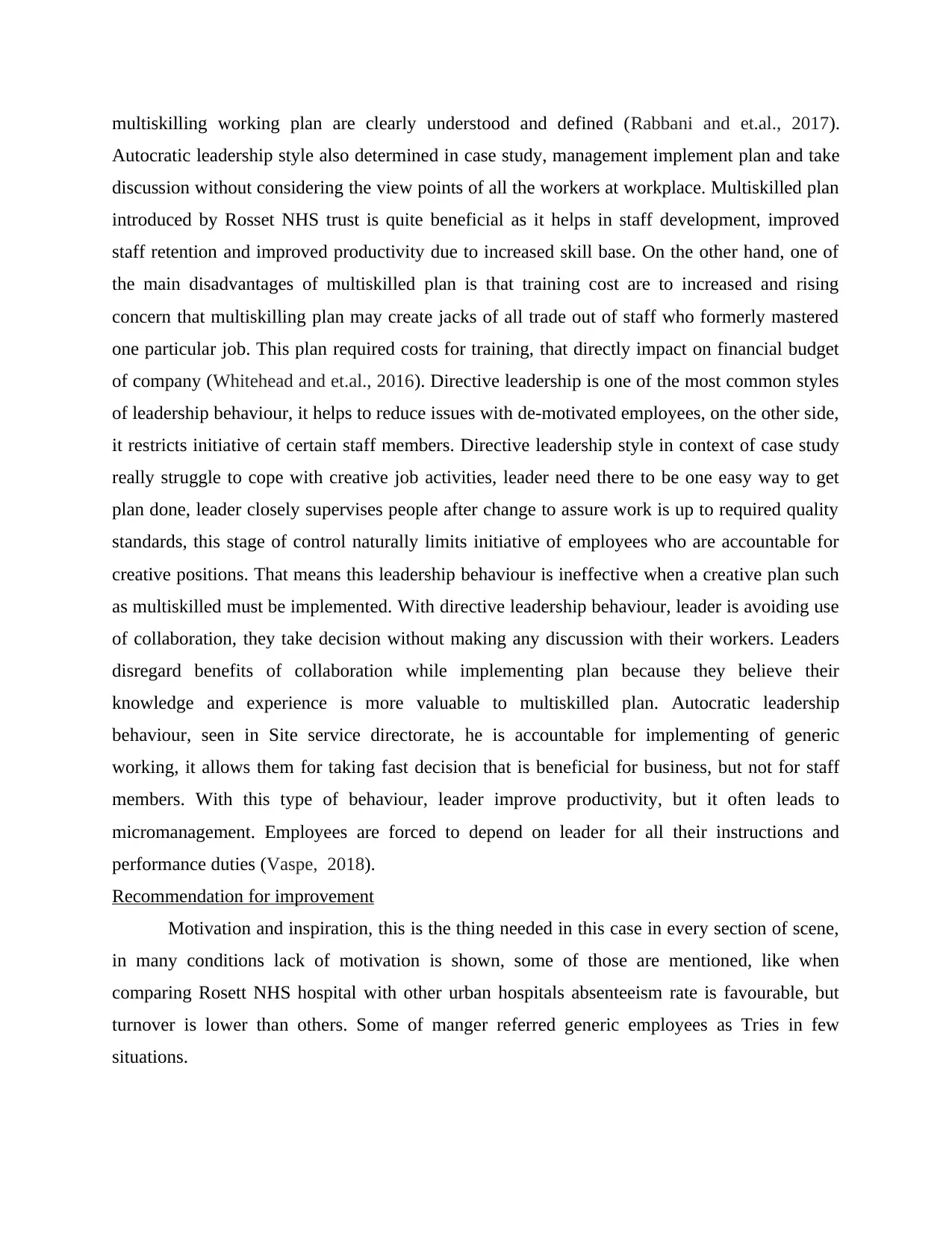
multiskilling working plan are clearly understood and defined (Rabbani and et.al., 2017).
Autocratic leadership style also determined in case study, management implement plan and take
discussion without considering the view points of all the workers at workplace. Multiskilled plan
introduced by Rosset NHS trust is quite beneficial as it helps in staff development, improved
staff retention and improved productivity due to increased skill base. On the other hand, one of
the main disadvantages of multiskilled plan is that training cost are to increased and rising
concern that multiskilling plan may create jacks of all trade out of staff who formerly mastered
one particular job. This plan required costs for training, that directly impact on financial budget
of company (Whitehead and et.al., 2016). Directive leadership is one of the most common styles
of leadership behaviour, it helps to reduce issues with de-motivated employees, on the other side,
it restricts initiative of certain staff members. Directive leadership style in context of case study
really struggle to cope with creative job activities, leader need there to be one easy way to get
plan done, leader closely supervises people after change to assure work is up to required quality
standards, this stage of control naturally limits initiative of employees who are accountable for
creative positions. That means this leadership behaviour is ineffective when a creative plan such
as multiskilled must be implemented. With directive leadership behaviour, leader is avoiding use
of collaboration, they take decision without making any discussion with their workers. Leaders
disregard benefits of collaboration while implementing plan because they believe their
knowledge and experience is more valuable to multiskilled plan. Autocratic leadership
behaviour, seen in Site service directorate, he is accountable for implementing of generic
working, it allows them for taking fast decision that is beneficial for business, but not for staff
members. With this type of behaviour, leader improve productivity, but it often leads to
micromanagement. Employees are forced to depend on leader for all their instructions and
performance duties (Vaspe, 2018).
Recommendation for improvement
Motivation and inspiration, this is the thing needed in this case in every section of scene,
in many conditions lack of motivation is shown, some of those are mentioned, like when
comparing Rosett NHS hospital with other urban hospitals absenteeism rate is favourable, but
turnover is lower than others. Some of manger referred generic employees as Tries in few
situations.
Autocratic leadership style also determined in case study, management implement plan and take
discussion without considering the view points of all the workers at workplace. Multiskilled plan
introduced by Rosset NHS trust is quite beneficial as it helps in staff development, improved
staff retention and improved productivity due to increased skill base. On the other hand, one of
the main disadvantages of multiskilled plan is that training cost are to increased and rising
concern that multiskilling plan may create jacks of all trade out of staff who formerly mastered
one particular job. This plan required costs for training, that directly impact on financial budget
of company (Whitehead and et.al., 2016). Directive leadership is one of the most common styles
of leadership behaviour, it helps to reduce issues with de-motivated employees, on the other side,
it restricts initiative of certain staff members. Directive leadership style in context of case study
really struggle to cope with creative job activities, leader need there to be one easy way to get
plan done, leader closely supervises people after change to assure work is up to required quality
standards, this stage of control naturally limits initiative of employees who are accountable for
creative positions. That means this leadership behaviour is ineffective when a creative plan such
as multiskilled must be implemented. With directive leadership behaviour, leader is avoiding use
of collaboration, they take decision without making any discussion with their workers. Leaders
disregard benefits of collaboration while implementing plan because they believe their
knowledge and experience is more valuable to multiskilled plan. Autocratic leadership
behaviour, seen in Site service directorate, he is accountable for implementing of generic
working, it allows them for taking fast decision that is beneficial for business, but not for staff
members. With this type of behaviour, leader improve productivity, but it often leads to
micromanagement. Employees are forced to depend on leader for all their instructions and
performance duties (Vaspe, 2018).
Recommendation for improvement
Motivation and inspiration, this is the thing needed in this case in every section of scene,
in many conditions lack of motivation is shown, some of those are mentioned, like when
comparing Rosett NHS hospital with other urban hospitals absenteeism rate is favourable, but
turnover is lower than others. Some of manger referred generic employees as Tries in few
situations.
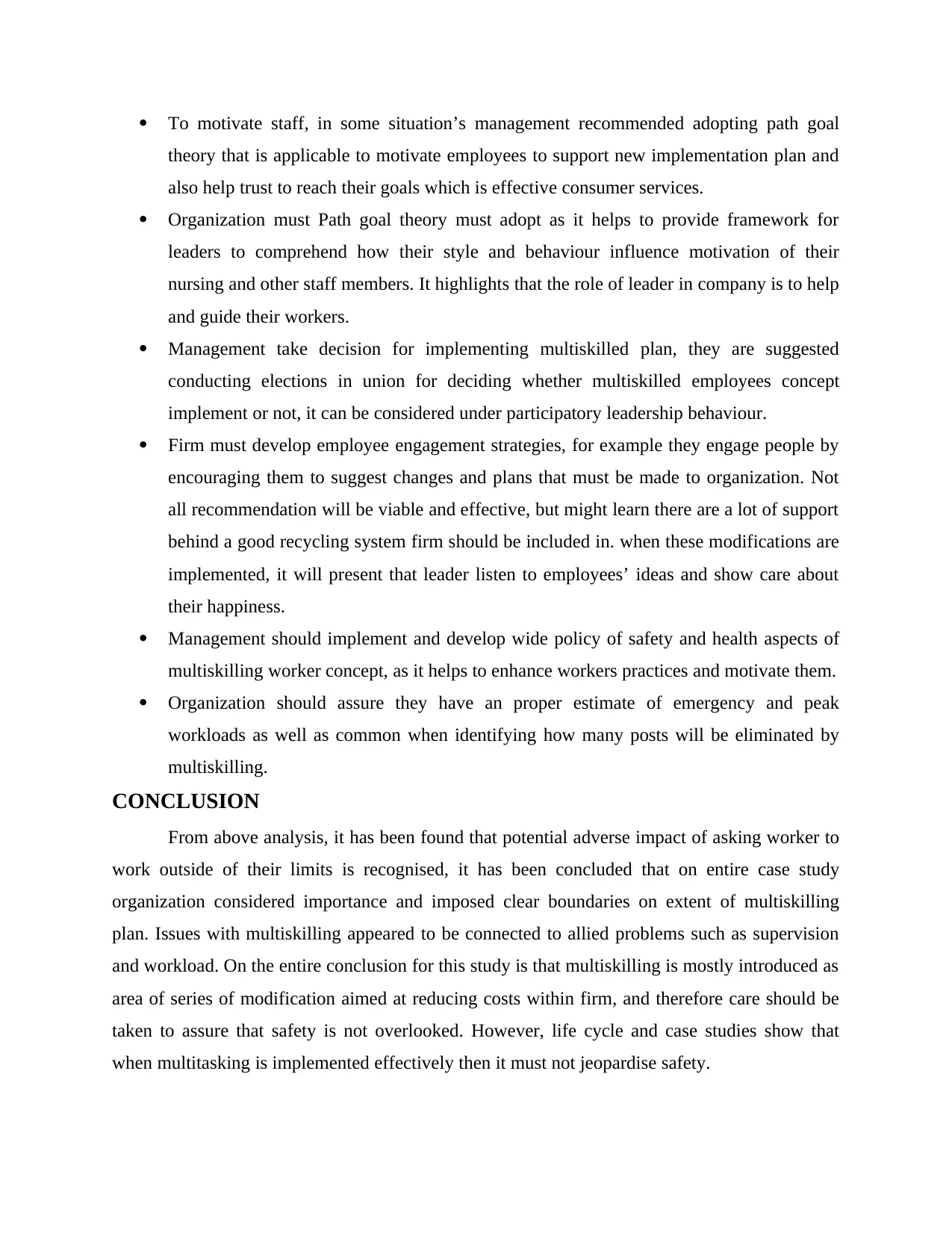
To motivate staff, in some situation’s management recommended adopting path goal
theory that is applicable to motivate employees to support new implementation plan and
also help trust to reach their goals which is effective consumer services.
Organization must Path goal theory must adopt as it helps to provide framework for
leaders to comprehend how their style and behaviour influence motivation of their
nursing and other staff members. It highlights that the role of leader in company is to help
and guide their workers.
Management take decision for implementing multiskilled plan, they are suggested
conducting elections in union for deciding whether multiskilled employees concept
implement or not, it can be considered under participatory leadership behaviour.
Firm must develop employee engagement strategies, for example they engage people by
encouraging them to suggest changes and plans that must be made to organization. Not
all recommendation will be viable and effective, but might learn there are a lot of support
behind a good recycling system firm should be included in. when these modifications are
implemented, it will present that leader listen to employees’ ideas and show care about
their happiness.
Management should implement and develop wide policy of safety and health aspects of
multiskilling worker concept, as it helps to enhance workers practices and motivate them.
Organization should assure they have an proper estimate of emergency and peak
workloads as well as common when identifying how many posts will be eliminated by
multiskilling.
CONCLUSION
From above analysis, it has been found that potential adverse impact of asking worker to
work outside of their limits is recognised, it has been concluded that on entire case study
organization considered importance and imposed clear boundaries on extent of multiskilling
plan. Issues with multiskilling appeared to be connected to allied problems such as supervision
and workload. On the entire conclusion for this study is that multiskilling is mostly introduced as
area of series of modification aimed at reducing costs within firm, and therefore care should be
taken to assure that safety is not overlooked. However, life cycle and case studies show that
when multitasking is implemented effectively then it must not jeopardise safety.
theory that is applicable to motivate employees to support new implementation plan and
also help trust to reach their goals which is effective consumer services.
Organization must Path goal theory must adopt as it helps to provide framework for
leaders to comprehend how their style and behaviour influence motivation of their
nursing and other staff members. It highlights that the role of leader in company is to help
and guide their workers.
Management take decision for implementing multiskilled plan, they are suggested
conducting elections in union for deciding whether multiskilled employees concept
implement or not, it can be considered under participatory leadership behaviour.
Firm must develop employee engagement strategies, for example they engage people by
encouraging them to suggest changes and plans that must be made to organization. Not
all recommendation will be viable and effective, but might learn there are a lot of support
behind a good recycling system firm should be included in. when these modifications are
implemented, it will present that leader listen to employees’ ideas and show care about
their happiness.
Management should implement and develop wide policy of safety and health aspects of
multiskilling worker concept, as it helps to enhance workers practices and motivate them.
Organization should assure they have an proper estimate of emergency and peak
workloads as well as common when identifying how many posts will be eliminated by
multiskilling.
CONCLUSION
From above analysis, it has been found that potential adverse impact of asking worker to
work outside of their limits is recognised, it has been concluded that on entire case study
organization considered importance and imposed clear boundaries on extent of multiskilling
plan. Issues with multiskilling appeared to be connected to allied problems such as supervision
and workload. On the entire conclusion for this study is that multiskilling is mostly introduced as
area of series of modification aimed at reducing costs within firm, and therefore care should be
taken to assure that safety is not overlooked. However, life cycle and case studies show that
when multitasking is implemented effectively then it must not jeopardise safety.
⊘ This is a preview!⊘
Do you want full access?
Subscribe today to unlock all pages.

Trusted by 1+ million students worldwide
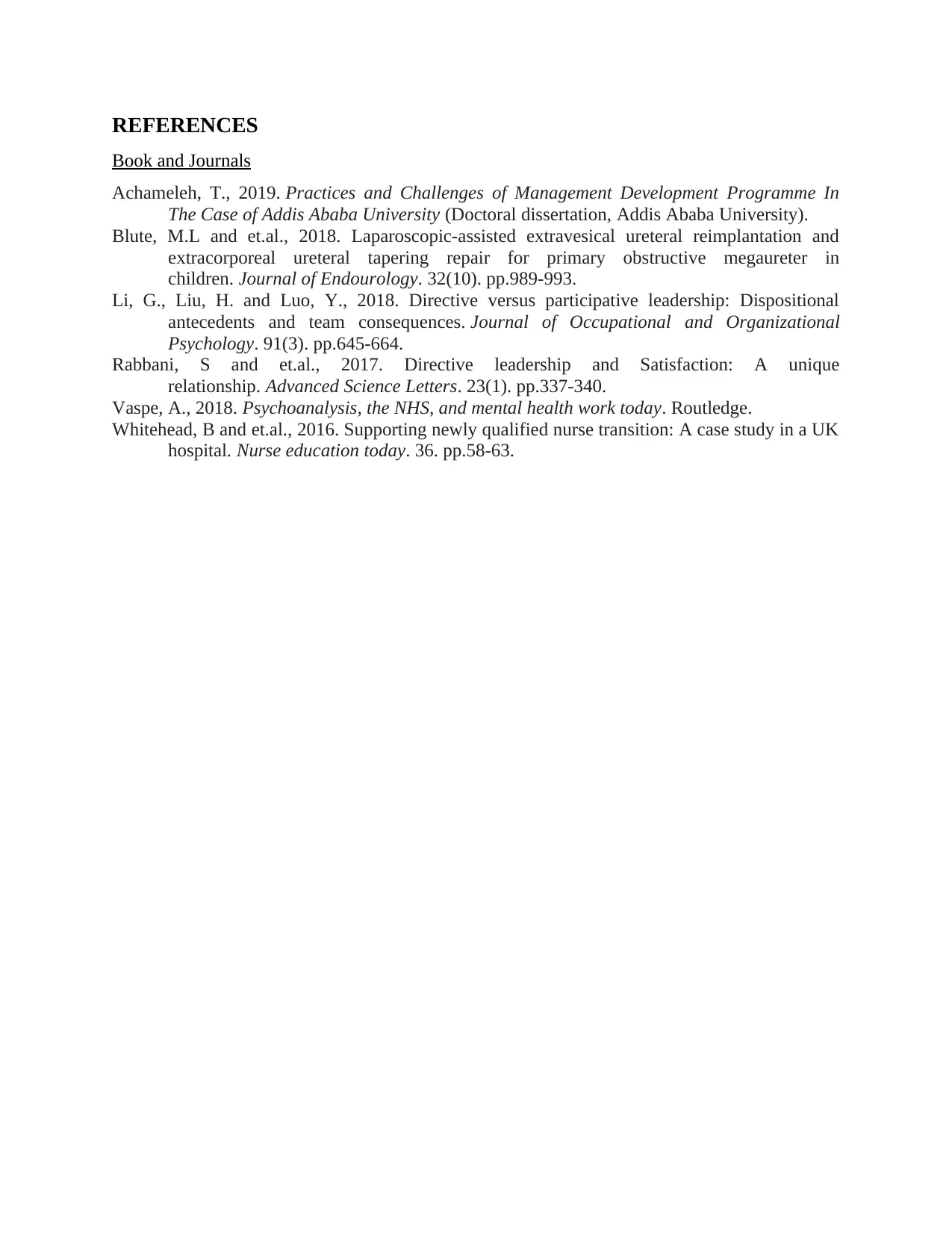
REFERENCES
Book and Journals
Achameleh, T., 2019. Practices and Challenges of Management Development Programme In
The Case of Addis Ababa University (Doctoral dissertation, Addis Ababa University).
Blute, M.L and et.al., 2018. Laparoscopic-assisted extravesical ureteral reimplantation and
extracorporeal ureteral tapering repair for primary obstructive megaureter in
children. Journal of Endourology. 32(10). pp.989-993.
Li, G., Liu, H. and Luo, Y., 2018. Directive versus participative leadership: Dispositional
antecedents and team consequences. Journal of Occupational and Organizational
Psychology. 91(3). pp.645-664.
Rabbani, S and et.al., 2017. Directive leadership and Satisfaction: A unique
relationship. Advanced Science Letters. 23(1). pp.337-340.
Vaspe, A., 2018. Psychoanalysis, the NHS, and mental health work today. Routledge.
Whitehead, B and et.al., 2016. Supporting newly qualified nurse transition: A case study in a UK
hospital. Nurse education today. 36. pp.58-63.
Book and Journals
Achameleh, T., 2019. Practices and Challenges of Management Development Programme In
The Case of Addis Ababa University (Doctoral dissertation, Addis Ababa University).
Blute, M.L and et.al., 2018. Laparoscopic-assisted extravesical ureteral reimplantation and
extracorporeal ureteral tapering repair for primary obstructive megaureter in
children. Journal of Endourology. 32(10). pp.989-993.
Li, G., Liu, H. and Luo, Y., 2018. Directive versus participative leadership: Dispositional
antecedents and team consequences. Journal of Occupational and Organizational
Psychology. 91(3). pp.645-664.
Rabbani, S and et.al., 2017. Directive leadership and Satisfaction: A unique
relationship. Advanced Science Letters. 23(1). pp.337-340.
Vaspe, A., 2018. Psychoanalysis, the NHS, and mental health work today. Routledge.
Whitehead, B and et.al., 2016. Supporting newly qualified nurse transition: A case study in a UK
hospital. Nurse education today. 36. pp.58-63.
Paraphrase This Document
Need a fresh take? Get an instant paraphrase of this document with our AI Paraphraser

1 out of 8
Related Documents
Your All-in-One AI-Powered Toolkit for Academic Success.
+13062052269
info@desklib.com
Available 24*7 on WhatsApp / Email
![[object Object]](/_next/static/media/star-bottom.7253800d.svg)
Unlock your academic potential
Copyright © 2020–2026 A2Z Services. All Rights Reserved. Developed and managed by ZUCOL.




